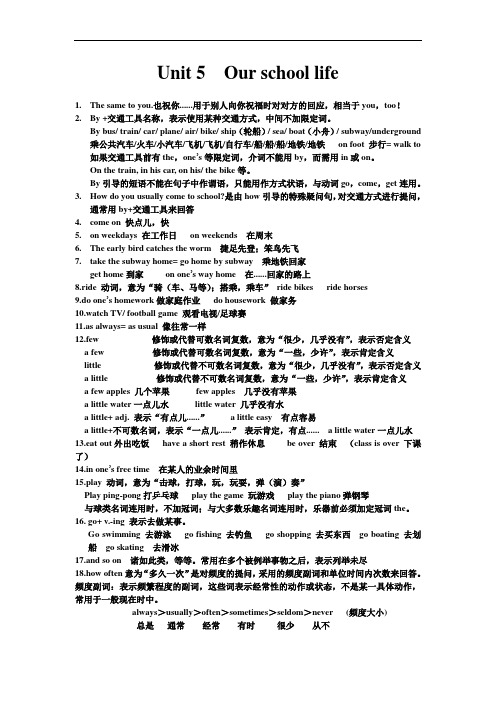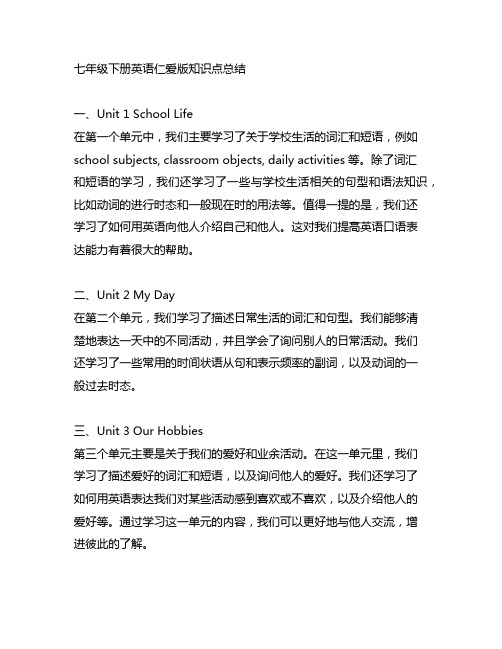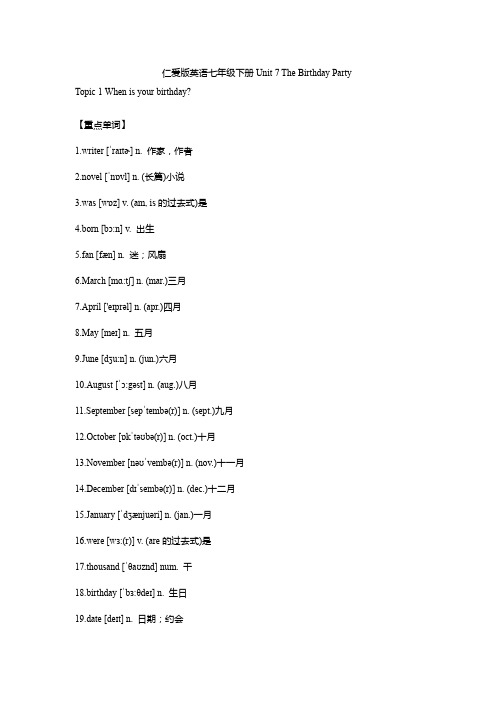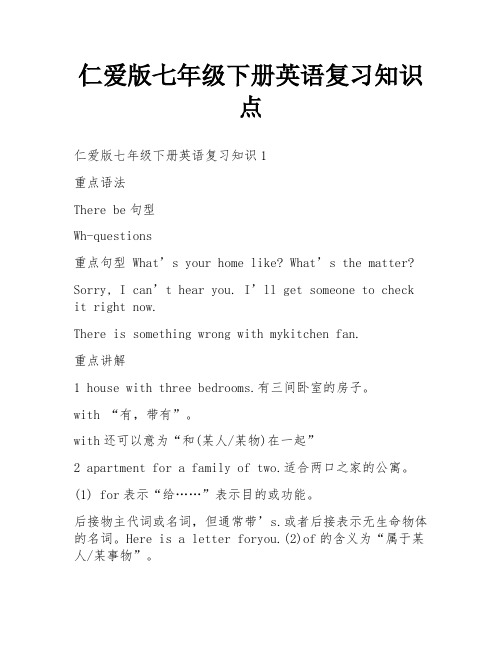仁爱英语七年级英语下册知识点总结复习
(完整版)仁爱版英语七年级下全部知识点总结.doc

七年级下英语知识点总结Unit 5 Topic1㈠短语总结1.在学校大门口 at the school gate2.来学校come to school3. 去学校go to school4. 上课have class / have classes5. 步行on foot6.骑自行车ride a bike/ ride bikes/ by bike / on a bike7.坐公交by bus / take a bus8.坐地铁by subway / take the subway / on the subway9.坐飞机by plane/ take the plane / on the plane10.坐小汽车by car / in a car/ take a car/ drive a car11. 坐轮船by ship12. 坐小船by boat13. 坐火车by train / on the train14. 在我们组in our group15.一群学生a group of students16.我们中的三个人 three of us17.在平日 on weekdays18.在周末 on the weekends / at weekends19.起床 get up20.睡觉 go to bed21.早起 get up early22.回家 go home23.到家 get home24.去动物园 go to the zoo25.去公园 go to the park26.看电影 see a movie / film27.看电视 watch TV28.在晚上 in the evening / at night29.帮助父母 help parents30.做某人的家庭作业 do one’s ( my/ her/ his/ your/ their)homework31.在学校 at school32.知道 ,了解 know about / learn about33.校园生活 school life34.一个美国学生 an American student35.在美国 in America / in the U.S.A.36.许多学生 many students/ a lot of students/ lots of students37.很少 very few38.吃午饭 have lunch39.出去吃饭 eat out40.在校期 on school days41.休息一会 have a short rest/ break42.午后 after lunch43.在某人的余 in one’s ( my/ his/ her/ their⋯)free/ spare time44.打球 play basketball45.踢足球 play soccer / football46.琴 play the piano47.吉他 play the guitar48.拉二胡 play erhu49.去游泳 go swimming / go for a swim50.去划船 go boating51.球 a ball game / ball games52.一年四次 four times a year53.听音 listen to music54.read books55.看 read newspapers56.看医生 see a doctor57.去 go to the library58.一周两次 twice a week59.朋友 meet friends60.每天 every day61.在七点半 at half past seven62.一小会 for a little while / for a short time63.晚后 after supper64.吃 have dinner65.吃早 have breakfast㈡重要句型1.I usually come to school by subway.同句 : I usually take the subway to school.划部分提 : How do you usually come to school?似的有:go to school by bike=go to schoolon a bike= ride a bike to school=ride to schoolgo home by bus=go home on a bus=take a bus home2.How do you usually/ often⋯?你通常 /常怎⋯?3.It ’stime for class.=It’s time to have class. =It’s time for having class.4.What about you? =How about you?5.How often ⋯? 率,回答可以用率副: always, usually, often,sometimes, seldom, never, every day ,every +其他名或表示率的短回答表示率的短:次数 +位e.g. : once a day / twice a week / three times a month6.The early bird catches the work. ( ) 笨先7.Work / Study must come first. 工作 / 学必放在第一位!8. Classes begin at eight. =Class begins at eight.提问:What time does the class begin? / What time do the classes begin?㈢重要单词的用法1.look (感官动词 ) 看起来,后面加形容词His mother looks very young.They look very cute.Her dress looks very nice.You look very cool in this coat.2. by 介词by 后面直接加表示交通工具的名词,中间不用任何词修饰,如: by bike by +动词 ing 形式,表示通过某种方式People show love to their mothers by giving cards.You can be a good student by working hard.3.over (形容词 ) School/ Class is over.4.begin现在分词 : beginning 过去式 : beganbegin to do sth , begin doing sthHe begins to write a letter. =He begins writing a letter.如果 begin 本身为分词,只能用begin to do sthHe is beginning to run.5.listen to 听(动作), hear 听见 (结果 )6.always 反义词 never7.本话题涉及的时态为一般现在时,句中常有频率副词或表示频率的短语,如果主语为三单,动词一定要用三单!(四)易错题1.You new watch ______ (look) very nice!2.Here ______(be) some news.3.Oh, come on! It’s time_____ going to school.4.They usually go to school on ________(feet).5.In my class, forty of _______(we) go to school by bike.6.The early bird ______ (catch) the worm.7.Kangkang often _____ (ride) a bike to the park.8.What time _____ (be)school over?9.Work must come ______(once).10.It ’stime ____you to get up.11.We often _____ books in the morning.12.Jill ’s friend like ______(study) in our school.13.Mr. Wang teaches ______(we) English. _____ of us like him.14.How about ______(go) out with me?15.Most students go to school _____ the school bus.16._______ do you go shopping with your mother?A. How soonB. How farC. How oftenD. How much17. What time do you usually get up _____ weekdays?18. He ______ busy, so he has no time to play with us.A. is alwaysB. seldom isC. always isD. often is19.The last class______(finish) at twelve o’clock.20.Let’s go______(boat).21.It’stime to have breakfast. 同(义句 )______________________________________________________.22.Michael often rides a bike to school. 同(义句 )______________________________________________________.23.I always go to work on foot. (对划线部分提问 )______________________________________________________.24.My mother goes shopping twice a week. 对(划线部分提问 )______________________________________________________.25.Mary always reads books in the library. 反(义句 )______________________________________________________.26.He usually does his homework at school.否(定句 )______________________________________________________.27.They often go to school by bus in the morning. 对(划线部分提问 ) ______________________________________________________.28.Jane seldom watches TV on weekdays改.(为一般疑问句 )______________________________________________________.29.He usually has lunch at home. 对(划线部分提问 )______________________________________________________.30.Li Ping often goes to work on foot. (同义句 )______________________________________________________.31.几乎没有学生乘地铁去学校。
仁爱英语七年级下册各单元知识点总结归纳Unit7Topic2

Unit7 Topic2 Section A学习目标1.学习can/can't的用法,学会谈论某人能够和不能够做的事情,并进行才艺展示。
2.学习并掌握选择疑问句的用法。
重点短语1.play the piano/guitar 弹钢琴/吉它2.perform ballet 表演芭蕾舞3.dance to disco 跳迪斯科4.at the party 在晚会上5.have a good time=enjoy oneself=have fun 玩得高兴,过得愉快名师课堂1.Do you want to sing Chinese songs or English songs?你想唱中文歌还是英文歌?由or构成的选择疑问句,其结构是一般疑问句或特殊疑问句加选择部分,选择部分用or连接,回答时不用Yes或No,而是直接选择。
e.g.-Do you want to play basketball or soccer?你是想打篮球还是踢足球?-I want to play soccer.我想踢足球。
2.But I can't sing Chinese songs.I can only sing English songs.但是我不会唱中文歌,我只会唱英文歌。
can 是情态动词,不能单独作谓语,只能和动词一起构成谓语,没有人称和数的变化,表示“能,会”之意。
含有can的陈述句变为否定句时,直接在其后加not,缩写为can't.含有ean的陈述句变为疑问句时,只需要把can 提前大写目子母,答语通常为Yes,主语+can./No,主语+can't.,有时也用一些程度的词来回答。
e.g - Can you play the piano?你会弹钢琴吗?-Yes,I can,/No,I can't,是的,我会。
/不,我不会。
(Yes,a little./No,not at all.是的,会一点。
仁爱英语七年级下册unit7知识点

Unit 7 Topic 3 知识点总结一、语法:一般过去式1、概念:表示过去发生的动作、事件、情况,而现在已结束,也可以表示过去时间里经常性或习惯性的动作,或主语过去的性格和能力。
2、常见的时间状语①yesterday ,yesterday morning/afternoon/evening②just now刚才in the past过去the day before yesterday前天③ago短语:a moment ago, an hour ago, three weeks ago, two months ago, four years ago等④in+时间点:in 2000,in 1995,in 1880⑤last短语:last week上周/last year去年/last month上个月/last night昨天晚上二、是三、1、at the party在聚会上2、recite a Chinese poem背汉语诗3、perform magic tricks表演魔术4、enjoy oneself=have a good time玩的愉快5、miss the chair 坐空椅子6、fall down摔倒7、hurt yourself伤了你自己8、at once立刻9、sth happened to sb某事发生在某人身上10、at that time在那时11、come back home回家12、lie to sb向某人撒谎13、tell sb the truth告诉某人真相14、go to the party with sb和某人一起去参加party15、last night昨天晚上16、tell a lie to sb向某人说谎17、make sb angry使某人生气18、lose the game输了比赛19、buy lots of food and drinks for sb为某人买许多食物与饮料20、each of us我们每一个人21、make the card by hand亲手制作卡片22、a big birthday cake with 13 candles带13根蜡烛的大生日蛋糕23、make a silent wish默默地许愿24、blow the candles out in one breath一口气吹灭蜡烛25、it’s your turn轮到你了26、it’s one’s turn to do sth轮到某人做某事27、enjoy doing sth=like doing sth喜欢做某事四、重要句型1、How was Kangkang’s birthday party? It was very nice.康康的生日party怎么样?它很不错。
(完整版)仁爱版七年级英语下册知识点总结

Unit 5 Our school life1.The same to you.也祝你......用于别人向你祝福时对对方的回应,相当于you,too!2.By +交通工具名称,表示使用某种交通方式,中间不加限定词。
By bus/ train/ car/ plane/ air/ bike/ ship(轮船)/ sea/ boat(小舟)/ subway/underground 乘公共汽车/火车/小汽车/飞机/飞机/自行车/船/船/船/地铁/地铁on foot 步行= walk to 如果交通工具前有the,one’s等限定词,介词不能用by,而需用in或on。
On the train, in his car, on his/ the bike等。
By引导的短语不能在句子中作谓语,只能用作方式状语,与动词go,come,get连用。
3.How do you usually come to school?是由how引导的特殊疑问句,对交通方式进行提问,通常用by+交通工具来回答e on 快点儿,快5.on weekdays 在工作日on weekends 在周末6.The early bird catches the worm 捷足先登;笨鸟先飞7.take the subway home= go home by subway 乘地铁回家get home到家on one’s way home 在......回家的路上8.ride 动词,意为“骑(车、马等);搭乘,乘车”ride bikes ride horses9.do one’s homework做家庭作业do housework 做家务10.watch TV/ football game 观看电视/足球赛11.as always= as usual 像往常一样12.few 修饰或代替可数名词复数,意为“很少,几乎没有”,表示否定含义a few 修饰或代替可数名词复数,意为“一些,少许”,表示肯定含义little 修饰或代替不可数名词复数,意为“很少,几乎没有”,表示否定含义a little 修饰或代替不可数名词复数,意为“一些,少许”,表示肯定含义a few apples 几个苹果few apples 几乎没有苹果a little water一点儿水little water 几乎没有水a little+ adj. 表示“有点儿......” a little easy 有点容易a little+不可数名词,表示“一点儿......”表示肯定,有点...... a little water一点儿水13.eat out外出吃饭have a short rest 稍作休息be over 结束(class is over 下课了)14.in one’s free time 在某人的业余时间里15.play 动词,意为“击球,打球,玩,玩耍,弹(演)奏”Play ping-pong打乒乓球play the game 玩游戏play the piano弹钢琴与球类名词连用时,不加冠词;与大多数乐趣名词连用时,乐器前必须加定冠词the。
七年级下册英语仁爱版知识点总结

七年级下册英语仁爱版知识点总结一、Unit 1 School Life在第一个单元中,我们主要学习了关于学校生活的词汇和短语,例如school subjects, classroom objects, daily activities等。
除了词汇和短语的学习,我们还学习了一些与学校生活相关的句型和语法知识,比如动词的进行时态和一般现在时的用法等。
值得一提的是,我们还学习了如何用英语向他人介绍自己和他人。
这对我们提高英语口语表达能力有着很大的帮助。
二、Unit 2 My Day在第二个单元,我们学习了描述日常生活的词汇和句型。
我们能够清楚地表达一天中的不同活动,并且学会了询问别人的日常活动。
我们还学习了一些常用的时间状语从句和表示频率的副词,以及动词的一般过去时态。
三、Unit 3 Our Hobbies第三个单元主要是关于我们的爱好和业余活动。
在这一单元里,我们学习了描述爱好的词汇和短语,以及询问他人的爱好。
我们还学习了如何用英语表达我们对某些活动感到喜欢或不喜欢,以及介绍他人的爱好等。
通过学习这一单元的内容,我们可以更好地与他人交流,增进彼此的了解。
四、Unit 4 Celebrations第四个单元主要是关于庆祝活动。
我们学习了描述不同庆祝活动的词汇和短语,以及询问别人关于庆祝活动的相关问题。
我们还学习了一些关于时间的表达方式,比如日期、星期、月份等。
我们还学习了一些关于情感的形容词,以及表示祝福的句型和短语。
五、Unit 5 The World Around Us在第五个单元中,我们学习了描述环境和自然现象的词汇和短语,以及相关的句型和语法知识。
我们可以用英语描述不同的自然现象,比如天气、季节等,也能够表达对自然环境的关心和热爱。
除了这些,我们还学习了一些关于地点和方位的词汇,以及表示允许和禁止的句型和短语。
六、Unit 6 Amazing Stories在第六个单元中,我们学习了一些关于神话故事和传奇人物的词汇和短语。
七年级下册英语unit7仁爱版知识点

七年级下册英语unit7仁爱版知识点Unit 7主要介绍了购物和做家务的相关语言知识。
以下是本单元的重点知识:
一、购物语言
1.询问价格和折扣:
- How much is it?(这个多少钱?)
- Is it on sale?(打折吗?)
- What's the discount?(有多少折扣?)
2.询问购物需求:
- Can I help you?(需要帮忙吗?)
- What size/color do you need?(你需要什么尺码/颜色?)
- What do you want to buy?(你想买什么?)
3.支付和找零:
- How do you want to pay?(你想用什么方式支付?)- Here's your change.(这是找给您的钱)
二、家务语言
1. 做家务的动词:
- sweep(扫地)
- mop(拖地)
- vacuum(吸尘)
- wipe(擦拭)
- dust(擦灰尘)
- clean(清洁)
- wash(洗)
- iron(熨烫)
2. 做家务的时间:
- on weekends(在周末)
- in the morning(早上)
- after school/work(放学/下班后)
- before bedtime(睡觉前)
3. 表示强调的副词:
- really(真的)
- very(非常)
- extremely(极其)
以上是本单元的重点知识,掌握上述语言知识可以帮助你更好地与他人交流。
希望你能够认真学习,在日常生活中灵活运用。
仁爱版英语七年级下册unit7重难点知识归纳总结

仁爱版英语七年级下册Unit 7 The Birthday Party Topic 1 When is your birthday?【重点单词】1.writer [ˈraɪtɚ] n. 作家,作者2.novel [ˈnɒvl] n. (长篇)小说3.was [wɒz] v. (am, is的过去式)是4.born [bɔ:n] v. 出生5.fan [fæn] n. 迷;风扇6.March [mɑ:tʃ] n. (mar.)三月7.April ['eɪprəl] n. (apr.)四月8.May [meɪ] n. 五月9.June [dʒu:n] n. (jun.)六月10.August [ˈɔ:gəst] n. (aug.)八月11.September [sepˈtembə(r)] n. (sept.)九月12.October [ɒkˈtəʊbə(r)] n. (oct.)十月13.November [nəʊˈvembə(r)] n. (nov.)十一月14.December [dɪˈsembə(r)] n. (dec.)十二月15.January [ˈdʒænjuəri] n. (jan.)一月16.were [wɜ:(r)] v. (are的过去式)是17.thousand [ˈθaʊznd] num. 千18.birthday [ˈbɜ:θdeɪ] n. 生日19.date [deɪt] n. 日期;约会20.calendar [ˈkælɪndə(r)] n. 日历21.plan [plæn] v. &n. 计划,打算22.celebrate ['selɪbreɪt] v. 庆祝23.party ['pɑ:tɪ] n. 聚会,宴会;党派24.fourth [fɔ:θ] num. 第四25.fifth [fɪfθ] num. 第五26.sixth [sɪksθ] num. 第六27.seventh ['sevnθ] num. 第七28.eighth [eɪtθ] num. 第八29.ninth [naɪnθ] num. 第九30.tenth [tenθ] num. 第十31.eleventh [ɪ'levnθ] num. 第十一32.twelfth [twelfθ] num. 第十二33.twentieth ['twentɪəθ] num. 第二十34.present ['preznt] n. 礼物35.shape [ʃeɪp] n. 形状v. 使成为……形状36.ball [bɔ:l] n. 球;舞会37.afraid [əˈfreɪd] adj. 担心;害怕38.star [stɑ:(r)] n. 星;明星39.mouse [maʊs] n. 老鼠40.square [skweə(r)] n. 正方形;广场;平方adj. 正方形的41.circle ['sɜ:kl] n. 圈,圆圈v. 圈出42.triangle ['traɪæŋɡl] n. 三角形43.rectangle [ˈrektæŋgl] n. 长方形;矩形44.oval ['əʊvl] n. 椭圆adj. 椭圆形的45.centimeter ['sentɪˌmi:tə] n. (cm)厘米46.Mrs. [ˈmɪsɪz] n. 太太,夫人47.cake [keɪk] n. 蛋糕【重点短语】1.be born 出生2.look at 看3.plan to do sth. 计划做某事4.have a birthday party 举办生日聚会5.the shape of ……的形状6.be like 像……7.how long 多长8.how wide 多宽e ... for ... 用……做……【重点句型】1.—When were you / was he/she born?你/他/她是什么时候出生的?—I/He/She was born on/in …我/他/她出生于……2.—Where were you / was he/she born?你/他/她在哪里出生的?—I/He/She was born in …我/他/她出生在……3.—When is your birthday?你的生日是什么时候?—May 13th.5月13号。
仁爱版七年级下册英语复习知识点

仁爱版七年级下册英语复习知识点仁爱版七年级下册英语复习知识1重点语法There be句型Wh-questions重点句型What’s your home like? What’s the matter?Sorry, I can’t hear you. I’ll get someone to check it right now.There is something wrong with mykitchen fan.重点讲解1 house with three bedrooms.有三间卧室的房子。
with “有,带有”。
with还可以意为“和(某人/某物)在一起”2 apartment for a family of two.适合两口之家的公寓。
(1) for表示“给……”表示目的或功能。
后接物主代词或名词,但通常带’s.或者后接表示无生命物体的名词。
Here is a letter foryou.(2)of的含义为“属于某人/某事物”。
She is a friend of Lily’s. = She is Lily’s friend.3 What’s the matter?怎么了?该句常用来询问某或某物出了什么什么问题或毛病;询问具体某人或某物出了什么问题时,还可以表达为:What’s the matter with sb./sth.某人或某物出了什么毛病。
What’s the matter? = What’swrong?4 Ihear you playing the piano.我听见你在弹钢琴。
hear…doing sth.“听见……在做某事”,强调正在进行的动作。
hear…dosth.“听见……做了某事”,强调全过程。
hearabout sth.听到关于某事物的消息 hear from sb.接到某人的来信、电话等hear of sb./sth.听到或知道某人或某事物的情况5 a lot of = lots of许多后接可数名词,相当于many;后接不可数名词,相当于much,用于肯定句中;但是注意:如果是否定句,则常用many或much.6 be far from… 离……远(抽象距离)be…away from…离……远(具体距离)My school is not far from thebookstore. The sea is 2 miles away fromthe hotel.7 There is something wrong with sb./sth.某人或某物出问题/有毛病了。
- 1、下载文档前请自行甄别文档内容的完整性,平台不提供额外的编辑、内容补充、找答案等附加服务。
- 2、"仅部分预览"的文档,不可在线预览部分如存在完整性等问题,可反馈申请退款(可完整预览的文档不适用该条件!)。
- 3、如文档侵犯您的权益,请联系客服反馈,我们会尽快为您处理(人工客服工作时间:9:00-18:30)。
仁爱英语七年级英语下册知识点期末总复习Unit 5 Topic1重点短语1.on foot go …on foot =walk ( to )…2.at the school gate在学校大门口3.on weekdays在平日,在工作日4.on weekends=on theweekend在周末5.after school 放学后6.after class 下课后7.after breakfast / lunch /supper早餐 / 午餐 / 晚餐后8.in ones free time在某人空闲时间9.have a rest 休息一下10.read books 读书11.go swimming 去游泳12.listen to music 听音乐13.watch TV 看电视14.do(one’s) homework 做作业15.go to the zoo / park 去动物园 / 公园16.once a week 一周一次17.every day 每天18.have classes 上课19.for a little while 一会儿20.go to bed 上床睡觉e on 快点,加油,来吧22.get up 起床23.talk with / to sb.与某人谈话24.at school 在学校、在上课25.go to school 去上学26.and so on ……等等重点句型1.Happy New Year! The same to you.2.Your new bike looks very nice. Thank you.3.How do you usually come to school? —I usually come toschool by subway.4.How often do you go to the library?5.—Once/Twice/Three times a week/Very often/Every day/Sedom6.The early bird catches the work. (谚语) 笨鸟先飞7.Work / Study must come first. 工作/ 学习必须放在第一位!8.Classes begin at eight. =Class begins at eight.9.What time does the class begin? / What time do the classesbegin?10.We have no more time. 我们没有更多的时间了。
11.I have four classes in the morning and two in the afternoon.我早上上四节课,下午上两节。
12.She goes to bed at about a quarter to ten. 她九点四十五分睡觉。
1.a, the, my 等限定词,就不能用by,而是用in或是on.表示通过某种方式)take the bus/car)on the bus/train/ship/planehis bike=by bikein a car/taxi)in myI always come to school by bus.People show love to their mothers by giving cards.巧辩异同on foot “走路”,是介词短语,walk “走路”,是动…. by car = drive… by bus = take2’感官动词,系动词Her dress looks very nice. You look very cool in this coat.look的短语 look the same看起来一样look like看起来像……look for寻找 look after =take care of 照顾,照料look around/about四处看看,四下环顾; lookback回头看;回顾;look out 当心,小心,留神; look through浏览,仔细查看;look up查寻,查阅;抬头看4. do one’s homework 做家庭作业(注:one’s 要随主语的变化而变化,常用形容词性物主代词my, your, their, our, his, her等)。
do my homework at school 在学校做作业5. want to do sth.“想做某事”,want 后接动词不定式作宾语。
know about“了解,知道关于…”。
we want to.........the school life of American students.......know about我们想了解一下美国学生的学校生活。
6;一点,一些;(否;一点,一些;用,都表示“几乎没有”,强调少; a little 和a few强调有一些。
e.g.He has a few friends. 他有几个朋友。
He has few friends. 他几乎没有朋友。
e.g. I can speak only a little Chinese. They haslittle money. 他们没有什麽钱a little 与 little 也可以用作副词,表示“有点”“稍稍”表示“很少”e.g. Can you speak English? ---Yes, but only a little. This book is a little more difficult than that one. (可修饰形容词比较级)She slept little last night. 昨天晚上,她没有怎么睡觉。
7. go+v.-ing 表示去做某事,类似: go fishing 去钓鱼 go shopping 去买东西go boating 去划船 go skating 去滑冰 go swimming 去游泳............... and soon...8. (1).频度副词always> usually>often> sometimes>seldom>never等或单位时间内的次数,表示频率的短语:次数+单位时间e.g. : once a week一周一次 twice a month每月两次three times a year每年三次How often do you go to the library? 你多久去一次图书馆?(2How far is it from here to the zoo? 6(3)/500 km.(,主要用来表示对将来一段时间的提问。
9is10现在分词: beginning 过去式: began What timewriting a letter.如果begin本身为分词,只能用begin to do sth He is11, hear 听见(结果)冠词用法1. 弹乐器前要带定冠词the,而进行球类运动则不带the。
play +棋类/球类/牌下……棋,打……球play soccer/basketballplay the +西洋乐器弹/拉……乐器 play the guitar/piano2.序数词,前面要用定冠词the。
on the second floor3.三餐前面不用冠词。
have breakfast/lunch/supper一般现在时语法讲解一般现在时表示:(常与频度副词never, seldom, sometimes, often,usually, always等连用)(1)现在所处的状态。
Jane is at school.(2)经常或习惯性的动作。
I often go to school by bus. (3)主语具备的性格和能力。
He likes playing football. (4)客观真理。
The earth goes round the sun.常用的时间状语:often, always, usually, sometimes, every day等等。
行为动词的一般现在时,助动词是do/don’t和does/doesn’t.当主语是第一、二人称和所有复数形式时,行为动词用原形。
肯定式:I go to school on foot. 否定式:I don’t go to school on foot.疑问式:Do you go to school on foot? —Yes, I do. —No, I don’t.当主语是第三人称单数时,动词用第三人称单数形式,在词尾加-s或-es。
肯定式:He goes to work by bus. 否定式:He doesn’t go to work by bus.疑问式:Does he go to work by bus? —Yes, he does. —No, he doesn’t.Unit 5 Topic2重点短语:1. make cards 制作卡片2. on the playground 在操场上3. in the library 在图书馆4. in the gym在体育馆5. on the shelf在书架上(shelves 复数)6. at the Lost and Found 在失物招领处7.clean the room打扫房间8.have a soccer game 举行足球比赛9. have an English class 上英语课10. write a letter 写信11. some of his photos= some photos of his 他的一些照片12. on time准时/in time 及时13. do better in sth 在某方面做得较好14. show sb. around…带领某人参观……15. at the moment“此刻,现在”. plan v.计划. be kind to sb=be friendly to sb 对某人很友好学科名词:重点句型1. What are you doing? ---- He is cleaning the dormitory.2. Are you doing your homework? Yes, I am./No, I am not.3. How long can I keep them? Two weeks.4. Thank you. ---It’s a pleasure. = A pleasure = My pleasure.别客气。
